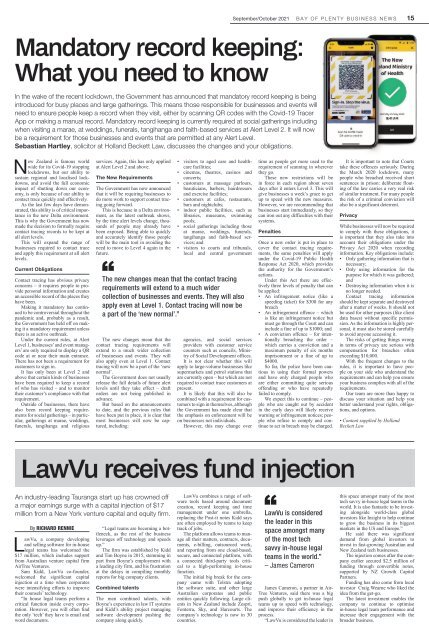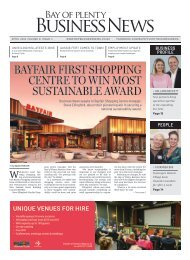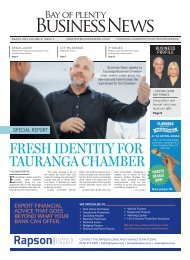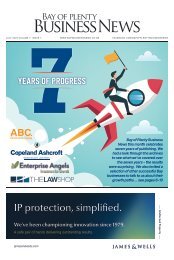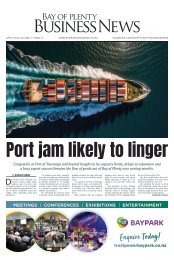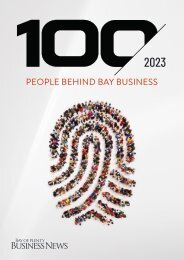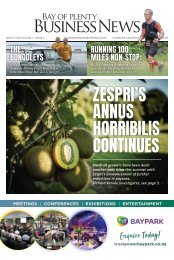September/October 2021 - Bay of Plenty Business News
From mid-2016 Bay of Plenty businesses have a new voice, Bay of Plenty Business News. This new publication reflects the region’s growth and importance as part of the wider central North Island economy.
From mid-2016 Bay of Plenty businesses have a new voice, Bay of Plenty Business News. This new publication reflects the region’s growth and importance as part of the wider central North Island economy.
You also want an ePaper? Increase the reach of your titles
YUMPU automatically turns print PDFs into web optimized ePapers that Google loves.
<strong>September</strong>/<strong>October</strong> <strong>2021</strong> BAY OF PLENTY BUSINESS NEWS 15<br />
Mandatory record keeping:<br />
What you need to know<br />
In the wake <strong>of</strong> the recent lockdown, the Government has announced that mandatory record keeping is being<br />
introduced for busy places and large gatherings. This means those responsible for businesses and events will<br />
need to ensure people keep a record when they visit, either by scanning QR codes with the Covid-19 Tracer<br />
App or making a manual record. Mandatory record keeping is currently required at social gatherings including<br />
when visiting a marae, at weddings, funerals, tangihanga and faith-based services at Alert Level 2. It will now<br />
be a requirement for those businesses and events that are permitted at any Alert Level.<br />
Sebastian Hartley, solicitor at Holland Beckett Law, discusses the changes and your obligations.<br />
New Zealand is famous world<br />
wide for its Covid-19 stopping<br />
lockdowns, but our ability to<br />
sustain regional and localised lockdowns,<br />
and avoid the full economic<br />
impact <strong>of</strong> shutting down our economy,<br />
is only because <strong>of</strong> our ability to<br />
contact trace quickly and effectively.<br />
As the last few days have demonstrated,<br />
this ability is <strong>of</strong> critical importance<br />
in the new Delta environment.<br />
This is why the Government has now<br />
made the decision to formally require<br />
contact tracing records to be kept at<br />
all alert levels.<br />
This will expand the range <strong>of</strong><br />
businesses required to contact trace<br />
and apply this requirement at all alert<br />
levels.<br />
Current Obligations<br />
Contact tracing has obvious privacy<br />
concerns – it requires people to provide<br />
personal information and creates<br />
an accessible record <strong>of</strong> the places they<br />
have been.<br />
Making it mandatory has continued<br />
to be controversial throughout the<br />
pandemic and, probably as a result,<br />
the Government has held <strong>of</strong>f on making<br />
it a mandatory requirement unless<br />
there is an active outbreak.<br />
Under the current rules, at Alert<br />
Level 1, businesses’ and event managers’<br />
are only required to display a QR<br />
code at or near their main entrance.<br />
There has not been a requirement for<br />
customers to sign in.<br />
It has only been at Level 2 and<br />
above that certain kinds <strong>of</strong> businesses<br />
have been required to keep a record<br />
<strong>of</strong> who has visited – and to monitor<br />
their customer’s compliance with that<br />
requirement.<br />
Outside <strong>of</strong> businesses, there have<br />
also been record keeping requirements<br />
for social gatherings – in particular,<br />
gatherings at marae, weddings,<br />
funerals, tangihanga and religious<br />
services. Again, this has only applied<br />
at Alert Level 2 and above.<br />
The New Requirements<br />
The Government has now announced<br />
that it will be requiring businesses to<br />
do more work to support contact tracing<br />
going forward.<br />
This is because in a Delta environment,<br />
as the latest outbreak shows,<br />
by the time alert levels change, thousands<br />
<strong>of</strong> people may already have<br />
been exposed. Being able to quickly<br />
and accurately identify those people<br />
will be the main tool in avoiding the<br />
need to move to Level 4 again in the<br />
future.<br />
The new changes mean that the<br />
contact tracing requirements will<br />
extend to a much wider collection<br />
<strong>of</strong> businesses and events. They will<br />
also apply even at Level 1. Contact<br />
tracing will now be a part <strong>of</strong> the ‘new<br />
normal’.<br />
The Government does not usually<br />
release the full details <strong>of</strong> future alert<br />
levels until they take effect – draft<br />
orders are not being published in<br />
advance.<br />
But based on the announcements<br />
to date, and the previous rules that<br />
have been put in place, it is clear that<br />
most businesses will now be captured,<br />
including:<br />
• visitors to aged care and healthcare<br />
facilities;<br />
• cinemas, theatres, casinos and<br />
concerts;<br />
• customers at massage parlours,<br />
beauticians, barbers, hairdressers<br />
and exercise facilities;<br />
• customers at cafes, restaurants,<br />
bars and nightclubs;<br />
• indoor public facilities, such as<br />
libraries, museums, swimming<br />
pools;<br />
• social gatherings including those<br />
at marae, weddings, funerals,<br />
tangihanga and faith-based services;<br />
and<br />
• visitors to courts and tribunals,<br />
local and central government<br />
The new changes mean that the contact tracing<br />
requirements will extend to a much wider<br />
collection <strong>of</strong> businesses and events. They will also<br />
apply even at Level 1. Contact tracing will now be<br />
a part <strong>of</strong> the ‘new normal’.”<br />
agencies, and social services<br />
providers with customer service<br />
counters such as councils, Ministry<br />
<strong>of</strong> Social Development <strong>of</strong>fices.<br />
It is not clear whether this will<br />
apply to large-volume businesses like<br />
supermarkets and petrol stations that<br />
are currently open – but which are not<br />
required to contact trace customers at<br />
present.<br />
It is likely that this will also be<br />
combined with a requirement for customers<br />
to sign in themselves, although<br />
the Government has made clear that<br />
the emphasis on enforcement will be<br />
on businesses not individuals.<br />
However, this may change over<br />
time as people get more used to the<br />
requirement <strong>of</strong> scanning in wherever<br />
they go.<br />
These new restrictions will be<br />
in force in each region about seven<br />
days after it enters Level 3. This will<br />
give businesses a week’s grace to get<br />
up to speed with the new measures.<br />
However, we are recommending that<br />
businesses start immediately, so they<br />
can iron out any difficulties with their<br />
systems.<br />
Penalties<br />
Once a new order is put in place to<br />
cover the contact tracing requirements,<br />
the same penalties will apply<br />
under the Covid-19 Public Health<br />
Response Act 2020, which provides<br />
the authority for the Government’s<br />
actions.<br />
Under this Act there are effectively<br />
three levels <strong>of</strong> penalty that can<br />
be applied:<br />
• An infringement notice (like a<br />
speeding ticket) for $300 for any<br />
breach<br />
• An infringement <strong>of</strong>fence – which<br />
is like an infringement notice but<br />
must go through the Court and can<br />
include a fine <strong>of</strong> up to $1000; and<br />
• A conviction <strong>of</strong>fence – for intentionally<br />
breaching the order –<br />
which carries a conviction and a<br />
maximum penalty <strong>of</strong> six months<br />
imprisonment or a fine <strong>of</strong> up to<br />
$4000.<br />
So far, the police have been cautious<br />
in using their formal powers<br />
and have only charged people who<br />
are either committing quite serious<br />
<strong>of</strong>fending or who have repeatedly<br />
failed to comply.<br />
We expect this to continue – people<br />
who are caught out by accident<br />
in the early days will likely receive<br />
warning or infringement notices; people<br />
who refuse to comply and continue<br />
to act in breach may be charged.<br />
It is important to note that Courts<br />
take these <strong>of</strong>fences seriously. During<br />
the March 2020 lockdown, many<br />
people who breached received short<br />
sentences in prison: deliberate flouting<br />
<strong>of</strong> the law carries a very real risk<br />
<strong>of</strong> similar treatment. For many people<br />
the risk <strong>of</strong> a criminal conviction will<br />
also be a significant deterrent.<br />
Privacy<br />
While businesses will now be required<br />
to comply with these obligations, it<br />
is important that they also take into<br />
account their obligations under the<br />
Privacy Act 2020 when recording<br />
information. Key obligations include:<br />
• Only gathering information that is<br />
necessary;<br />
• Only using information for the<br />
purpose for which it was gathered;<br />
and<br />
• Destroying information when it is<br />
no longer needed.<br />
Contact tracing information<br />
should be kept separate and destroyed<br />
after a matter <strong>of</strong> weeks. It should not<br />
be used for other purposes (like client<br />
data bases) without specific permission.<br />
As the information is highly personal,<br />
it must also be stored carefully<br />
to avoid anyone accessing it.<br />
The risks <strong>of</strong> getting things wrong<br />
in terms <strong>of</strong> privacy are serious with<br />
compensation for breaches <strong>of</strong>ten<br />
exceeding $10,000.<br />
With the frequent changes to the<br />
rules, it is important to have people<br />
on your side who understand the<br />
requirements and can help you ensure<br />
your business complies with all <strong>of</strong> the<br />
requirements.<br />
Our team are more than happy to<br />
discuss your situation and help you<br />
better understand your rights, obligations,<br />
and options.<br />
• Content supplied by Holland<br />
Beckett Law<br />
LawVu receives fund injection<br />
An industry-leading Tauranga start up has crowned <strong>of</strong>f<br />
a major earnings surge with a capital injection <strong>of</strong> $17<br />
million from a New York venture capital and equity firm.<br />
By RICHARD RENNIE<br />
LawVu, a company developing<br />
and selling s<strong>of</strong>tware for in-house<br />
legal teams has welcomed the<br />
$17 million, which includes support<br />
from Australian venture capital firm<br />
AirTree Ventures.<br />
Sam Kidd, LawVu co-founder,<br />
welcomed the significant capital<br />
injection at a time when corporates<br />
were intensifying efforts to improve<br />
their counsels’ technology.<br />
“In house legal teams perform a<br />
critical function inside every corporation.<br />
However, you will <strong>of</strong>ten find<br />
the only ‘tech’ they have is email and<br />
word documents.<br />
“Legal teams are becoming a bottleneck,<br />
as the rest <strong>of</strong> the business<br />
leverages <strong>of</strong>f technology and speeds<br />
up.”<br />
The firm was established by Kidd<br />
and Tim Boyne in 2015, stemming in<br />
part from Boyne’s employment with<br />
a leading city firm, and his frustration<br />
at the delays in compiling monthly<br />
reports for big company clients.<br />
Combined talents<br />
The men combined talents, with<br />
Boyne’s experience in law IT systems<br />
and Kidd’s ability project managing<br />
s<strong>of</strong>tware development pushing the<br />
company along quickly.<br />
LawVu combines a range <strong>of</strong> s<strong>of</strong>tware<br />
tools based around document<br />
creation, record keeping and time<br />
management under one umbrella,<br />
replacing the Post-it notes Kidd says<br />
are <strong>of</strong>ten employed by teams to keep<br />
track <strong>of</strong> jobs.<br />
The platform allows teams to manage<br />
all their matters, contracts, documents,<br />
e-billing, outsourced work,<br />
and reporting from one cloud-based,<br />
secure, and connected platform, with<br />
a connected third-party tools critical<br />
to a high-performing in-house<br />
function.<br />
The initial big break for the company<br />
came with Telstra adopting<br />
the s<strong>of</strong>tware suite, and other large<br />
Australian corporates and public<br />
entities quickly following. Large clients<br />
in New Zealand include Zespri,<br />
Fonterra, Sky, and Harcourts. The<br />
company’s technology is now in 30<br />
countries.<br />
LawVu is considered<br />
the leader in this<br />
space amongst many<br />
<strong>of</strong> the most tech<br />
savvy in-house legal<br />
teams in the world.”<br />
– James Cameron<br />
James Cameron, a partner in Air-<br />
Tree Ventures, said there was a big<br />
push globally to get in-house legal<br />
teams up to speed with technology,<br />
and improve their efficiency in the<br />
process.<br />
“LawVu is considered the leader in<br />
this space amongst many <strong>of</strong> the most<br />
tech savvy in-house legal teams in the<br />
world. It is also fantastic to be investing<br />
alongside world-class global<br />
investors like Insight to help continue<br />
to grow the business in its biggest<br />
markets in the US and Europe.”<br />
He said there was significant<br />
demand from global investors to<br />
invest in fast-growing Australian and<br />
New Zealand tech businesses.<br />
The injection comes after the company<br />
earlier secured $2.5 million <strong>of</strong><br />
funding through convertible notes,<br />
supported by NZ Growth Capital<br />
Partners.<br />
Funding has also come from local<br />
investor Craig Wearne who liked the<br />
idea from the get-go.<br />
The latest investment enables the<br />
company to continue to optimise<br />
in-house legal team performance and<br />
increase their engagement with the<br />
broader business.


